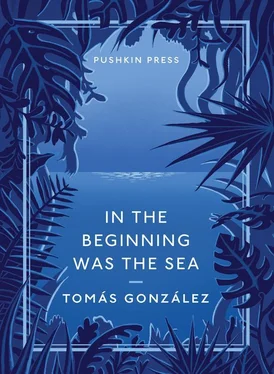J. asked Salomón to try out the new net. Since this was not high season for fishing, the early catches were modest. The men would go out at night, drop anchor three hundred metres from shore and fish for three or four hours. J. never went with them, but he liked to watch the lights bobbing on the waves; he could just make out the shadows of the boats against the dark water and hear the distant voices of the fishermen.
In Salomón’s care, the fishing net remained as good as new — perhaps better than new, since it seemed to improve with experience. Staked out on the beach, the nylon mesh gleamed in the first rays of sunlight with a delicate, spectral beauty; the sun coursed along threads still glossy with dew while the breeze created ripples of silvery light that looked like tendrils of wind itself.
At noon, Salomón and his eldest son would come to pick up the net. They never came into the house. J. would watch from the veranda as the son unpegged it from the stakes, folding the net into sections which he handed to Salomón, who gathered it into his outstretched arms before slinging it over his shoulder with an effortless gesture, and the two men would walk up to the house.
Having stowed the net in the room where the tools were kept, Salomón would come out onto the veranda, crouch down and chat with J. for a while, almost always about fish. He would smoke a couple of cigarettes and then head on his way. Rarely did he accept a drink. “Come winter, the real fishing season will start,” he always said before he left.
THE RAINS CAME and so began the first of the two winters J. would spend on the finca ; the first of his last two winters on earth.
Thick grey clouds massed over the sea, lending it a mournful, boundless beauty. Before the first drops fell, the sun would slip through a chink in the clouds spilling showers of light over the dark waters. Lightning shattered the skies with a thunderous boom as gulls shrieked high in the heavens. Then the clouds merged and fat raindrops chimed like pebbles on the corrugated iron roof, heralding torrential downpours that seemed to last forever. The muggy heat that preceded the cloudbursts would give way to a bleak, dusky coolness as the leaden outlines of the clouds melted until it seemed as though the land and the waters had merged again and the darkness was one with the light. Sometimes it was possible to hear above the raging elements the muffled purr of a boat, its blurred outline barely visible out at sea.
At the beginning of winter, Elena and J. would shut themselves away in their bedroom to wait out the rain-storms, overcome by damp, dark desire. As heavy raindrops hammered monotonously on the roof, they made love until they were exhausted. But whenever Elena had to get out of bed to serve a customer in the shop, she could not help but look outside. The desolate, dark seascape made her heartsick and the muddy streams gushing down the mountain and turning fields around the house into swampland made her want to cry. The tall mango tree in the garden, so majestic in summer, now seemed crumpled and shrunken in the rain. Everything she could see, the dogs, the placid cattle, the battered palm trees, even the sea itself looked dreary. Overcome by a wave of crushing loneliness, Elena would go back to the bedroom, to the warmth of J.’s body.
After two or three days of incessant rain, the waters would retreat. After a long night listening to the clattering on the roof, J. would wake to find himself suddenly faced with light and silence. “The rain has stopped, hermana ,” he would say, shaking Elena awake, and the two of them would run out onto the veranda where a universe that seemed new-made appeared before their eyes. The sun beat down on the wet leaves of the trees, beat down on the sands, beat down on the spume thrown up by the waves. Leaping from the water, the sardines seemed to tinkle in the air. Flocks of seagulls, dazzling white in the dawn light, wheeled above the ocean, diving for fish in exultant confusion.
And yet, these periods of remission were short-lived. Before long the clouds would gather again, covering the earth with their flinty shadow. When the waters once again began to teem, Elena and J. would lapse back into their desperate lust and shut themselves away in the bedroom.
Until Gilberto said:
“Now would be a good time to plant the seedbeds, jefe .”
J. was sitting on the veranda at dusk, watching the darkness move from grey to black. Elena was in the bedroom, asleep. He needed to shake off this lethargy, to rid himself of the despair that burned like an ulcerous panic in his belly. For almost six weeks, he had done no work of any importance on the finca .
“OK, Gilberto,” he said, “let’s start tomorrow.”
The following day, wearing heavy oilskin capes, they began preparing the ground. At first, Elena worked with them, but later, when she could no longer stand the insidious raindrops that dribbled down her neck and trickled down her back, when the muggy heat that smelt of rubber became unbearable, she abandoned the work and shut herself in the house.
“If the bloody sewing machine hadn’t been damaged, at least I’d have something to do,” she said to J.
She ate in an attempt to cancel out the terrible weight of her boredom. Hardly had she finished breakfast than she was already salivating, with neurotic delight, anticipating the fried sea bream she would have for lunch. Between meals, she gorged on ripe mangoes.
As Salomón had said, with the rains came huge catches. Fish were so abundant that the net did not need to go out every night. Every time it was hauled in, the net teemed with enough fish to feed the house and the surrounding area for days.
On the night of the first big catch, Salomón brought J. thirty large bluestripe jacks, fifteen sunfish and four sea bream a metre and a half long. This was half of the catch.
“Just give us half of this, Salomón,” said J. “Take the rest and give it to the people in the village.”
But even this proved to be too much. Mercedes hung some of the fish over the wood stove to smoke and salted the rest. Four days later the salt fish began to stink and they had to throw it out.
THE DUE DATE on the loan with the bank coincided with the depths of Elena’s boredom during that interminable winter.
“One of us should go to Medellín to try and renew the loan,” J. said, knowing she would be the one to go.
“Fine,” Elena said immediately. “You sign a power of attorney and I’ll make the trip.”
Two days later she walked next to J., trailing behind Gilberto as they headed for the town. Since money was short, it had been decided that she would take the weekly ferry rather than hiring an express boat. Though it had stopped raining, the dirt track was a quagmire. Elena and J. were wearing rubber boots while Gilberto had on the same battered leather sandals he wore in summer. In the deep mud, his feet made a sucking sound Elena found nauseating.
They reached town with two hours to spare before the ferry sailed. At noon, Gilberto took them to a café owned by one of his relatives where they had a huge sunfish casserole, then, drowsy from the heavy lunch, they sat on the beach on an upturned canoe waiting for the ferry.
Just as Elena clambered into the canoe that would take her out to the ferry, the first fat raindrops began to fall. By the time she was aboard, the downpour was in full spate.
The ferry was a wooden hulk twelve metres by four painted in blue, yellow and red. Ten long benches ran from stem to stern and the deck was covered by a broad canopy to shelter passengers from the rain. Elena stowed her suitcase and then settled herself next to one of the guardrails in the bow. She could see J. staring at the ferry from the shore. She waved and he waved back but made no move to leave. He went on standing there, staring out at the ship. “He’s getting soaked,” thought Elena.
Читать дальше










